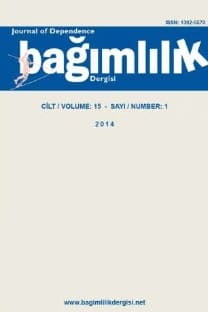Nomofobi̇, Gelişmeleri̇ Kaçırma Korkusu ve Akademik Başarı Arasındaki̇ İlişki̇
Nomofobi̇, FoMO, Akademik Başarı, Hemşirelik Öğrencisi
Correlation between Nomophobia, Fear of Missing Out and Academic Success
Nomophobia, FoMO, Academic Success, Nursing Student,
___
- Elhai JD, Levine JC, Dvorak RD, et al. Fear of missing out, need for touch, anxiety and depression are related to problematic smartphone use. Computers in Human Behavior 2016; 63: 509-516.
- Kaplan Akıllı G, Gezgin DM. Üniversite Öğrencilerinin Nomofobi Düzeyleri ile Farklı Davranış Örüntülerinin Arasındaki İlişkilerin İncelenmesi. Mehmet Akif Ersoy Üniversitesi Eğitim Fakültesi Dergisi 2016; 40: 51-69.
- Lee JH. Future of the Smartphone for Patients and Healthcare Providers. Healthcare informatics research 2016; 22(1): 1–2.
- Aceto G, Persico V, Pescapé A. The role of Information and Communication Technologies in healthcare: taxonomies, perspectives, and challenges. Journal of Network and Computer Applications 2018; 107: 125-154.
- Gutiérrez-Puertas V, Gutiérrez-Puertas L, Aguilera-Manrique G, et al. Nursing Students’ Perceptions of Smartphone Use in the Clinical Care and Safety of Hospitalised Patients. International Journal of Environmental Research and Public Health 2021;18(3): 1307.
- Ramjan LM, Salamonson Y, Batt S, et al. The negative impact of smartphone usage on nursing students: An integrative literature review. Nurse Educ. Today 2021; 102: 104909.
- Aditya DS, Suprayitno E. Mobile Technology in Indonesian Nursing Education: Potential and Challenge. Jurnal Keperawatan 2021; 12(1): 1-13.
- Dayapoglu N, Kavurmaci M, Karaman S. The relationship between the problematic mobile phone use and life satisfaction, loneliness, and academic performance in nursing students. Int. J. Caring Sci., 2016; 9(2): 647-652.
- Gökler ME, Aydın R, Ünal E, et al. Sosyal ortamlarda gelişmeleri kaçırma korkusu ölçeğinin Türkçe sürümünün geçerlilik ve güvenilirliğinin değerlendirilmesi. Anadolu Psikiyatri Dergisi 2016; 17(1): 52-59.
- Kargın M, Türkben Polat H, Coşkun Şimşek D. Evaluation of internet addiction and fear of missing out among nursing students. Perspect Psychiatr Care 2020; 56(3): 726-731.
- Akturk U, Budak F. The correlation between the perceived social support of nursing students and smartphone addiction. Int. J. Caring Sci 2019; 12(3): 1825.
- Kaniaru D, Karani A, Waithera M. The Effect of Smartphones Use on Altering the Level of Attention and Learning Styles among Undergraduate Nursing Students in Kenya. stress, 2020; 13(17): 18.
- Hoşgör H, Coşkun F, Çalişkan F. Relationship between nomophobia, fear of missing out, and perceived work overload in nurses in Turkey. Perspect Psychiatr Care 2020; 57(3): 1026–1033.
- Bülbüloğlu S, Özdemir A, Kapıkıran G, et al. The effect of nomophobic behavior of nurses working at surgical clinics on time management and psychological well-being. J. Subst. Use 2020; 25(3): 318-323.
- Lupo R, Zacchino S, Caldararo C, et al. The use of electronical devices and relative levels of Nomophobia within a group of Italian nurses: an Observational Study. Epidemiology, Biostatistics and Public Health, 2020; 17(1): e13272-1– e13272-10.
- Ma H, Zou JM, Zhong Y, et al. The influence of mobile phone addiction and work procrastination on burnout among newly graduated Chinese nurses. Perspect Psychiatr Care 2021; 57(4): 1798–1805.
- Yildirim C, Correia AP. Exploring the dimensions of nomophobia: Development and validation of a self-reported questionnaire. Comput. Hum. Behav 2015; 49: 130-137.
- Przybylski AK, Murayama K, DeHaan CR, et al. Motivational, emotional, and behavioral correlates of fear of missing out. Comput. Hum. Behav 2013; 29(4): 1841-1848.
- Okuyan C, Döner Güner P, Uslusoy Güneş S. Hemşirelik ve Tıp Fakültesi Öğrencilerinin Nomofobi Düzeylerinin Belirlenmesi. Gümüşhane Üniversitesi Sağlık Bilimleri Dergisi. 2019; 8(4):372-382.
- Márquez-Hernández VV, Gutiérrez-Puertas L, Granados-Gámez G, et al. Problematic mobile phone use, nomophobia and decision-making in nursing students mobile and decision-making in nursing students. Nurse Educ. Pract, 2020; 49: 102910.
- Gutiérrez-Puertas L, Márquez-Hernández VV, Gutiérrez-Puertas V, et al. (2020). The effect of cell phones on attention and learning in nursing students. Comput Inform Nurs 2020; 38(8): 408-414.
- Qutishat M, Abu Sharour L. Relationship Between Fear of Missing Out and Academic Performance Among Omani University Students: A Descriptive Correlation Study. Oman Medical Journal 2019; 34(5): 404–411.
- Ashwini KM, Arathi TV, Ramadas D. Effect of Smartphone on Health: A Study on Nursing Students. International Journal of Nursing Education and Research 2020; 8(4), 432-435.
- Hamutoglu NB, Gezgin DM, Sezen-Gultekin G, et al. Relationship between nomophobia and fear of missing out among Turkish university students. Cypriot Journal of Educational Sciences, 2018; 13(4): 549–561.
- Hoşgör H, Hoşgör DG. The relationship among nomophobia, fear of missing out and demographic variables: example of the healthcare manager candidates. Curr Addict Res, 2019; 3(1): 16-24.
- Moreno-Guerrero AJ, Hinojo-Lucena FJ, Trujillo-Torres JM, et al. Nomophobia and the influence of time to REST among nursing students. A descriptive, correlational and predictive research. Nurse Educ. Pract, 2021; 52: 103025.
- ISSN: 1302-5570
- Yayın Aralığı: Yılda 4 Sayı
- Başlangıç: 2000
- Yayıncı: Galenos Yayınevi
Fahriye PAZARCIKCI, Hatice AĞRALI, Ayşe AYDINLI
Asena UZDU YAŞAR, Buket CİNEMRE, Ali ERDOĞAN
Covid-19 Salgını Sürecinde Alkol ve Madde Bağımlılarının Kullanım ve Tedavi Deneyimleri
Melike SEMERCİ, Burak ACAR, Ömer Miraç YAMAN
Opioid Kullanım Bozukluğu Olan Hastalarda Psikolojik Dayanıklılığın Tedavi Devamlılığı İle İlişkisi
Şafak YALÇIN ŞAHİNER, Gonca AŞUT, İsmail Volkan ŞAHİNER
Üniversite Öğrencilerinde İnternet Bağımlılığı ile Uyku Kalitesi Arasındaki İlişki
Mehmet Enes SAĞAR, Hülya KÖK EREN
Ergenlerde Dijital Oyun Bağımlılığı ile Sosyal Beceriler Arasındaki İlişki
Harun ASLAN, Mehmet BAŞCILLAR, Kasım KARATAŞ
F. Isil BİLİCAN, Mustafa ÇETİNKAYA, Elif ÇELEBİ, Birgül GÜLEN, Huzeyfe BARHAM
Vaka Danışmanlığının Sentetik Kannabinoid Bağımlılarının Remisyon Süreleri Üzerine Etkisi
Yusuf YUSUFOĞLU, Rabia BİLİCİ, Muhammed ARCA
Alışveriş Bağımlılığında Cinsiyet Farklılığı Bildiren Çalışmaların Analizi
Derya SASMAN KAYLI, Şevval Özge ÖZLEM
